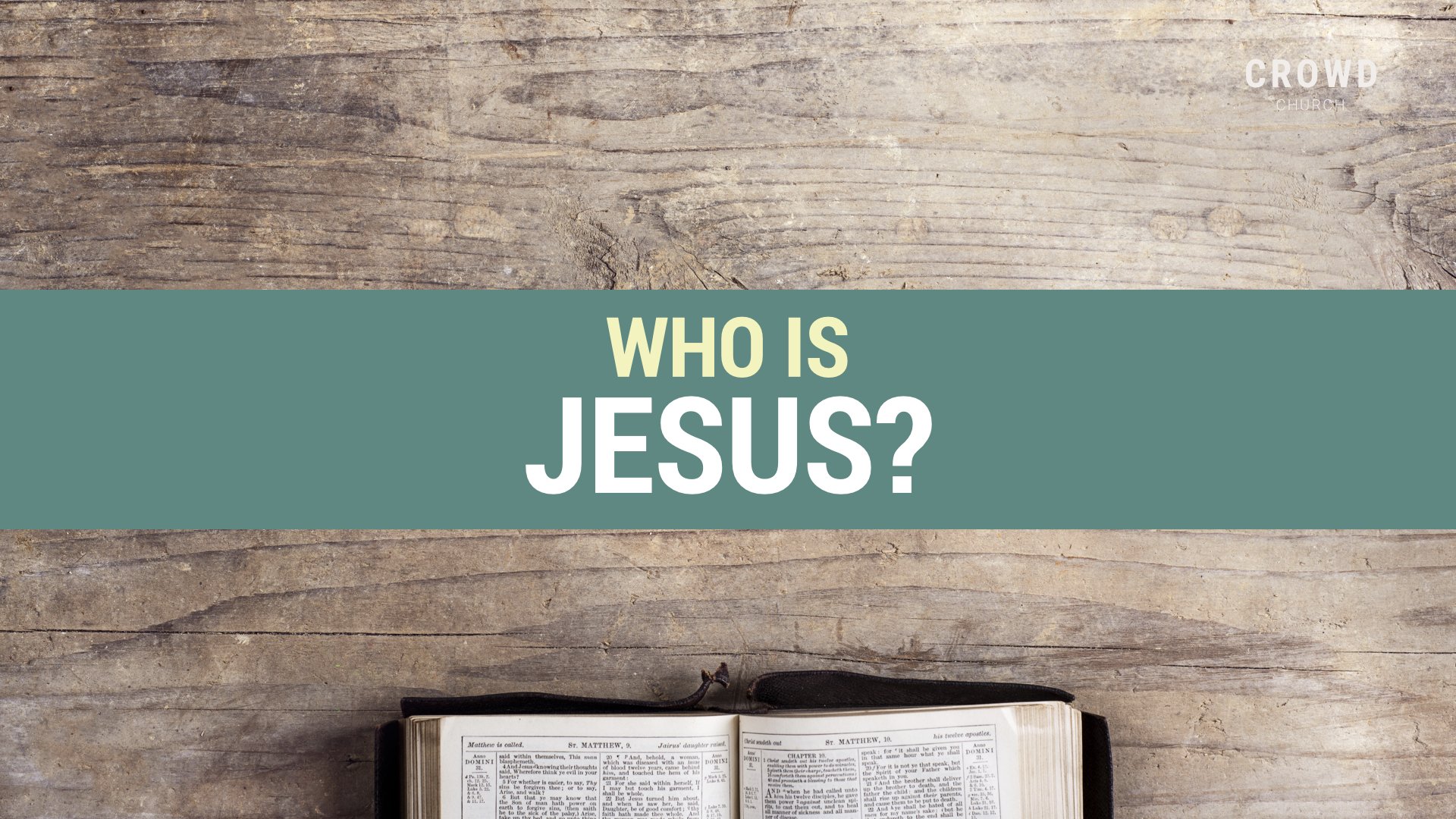What Does The Bible Say About God?
Video Timeline
WELCOME
0:00 - Welcome with Matt & John
TALK with Dan Rogers
06:13 - What does the Bible say about God?
08:13 - The God of the Bible
11:08 - The Genesis Story
12:10 - The Bible vs Pantheism
13:40 - Ancient Gods vs the God of the Bible
20:54 - How Can I See God While Reading The Scriptures?
21:46 - Put Aside Intellectual Pride
PRAYER
28:14 - Prayer For Ukraine
WORSHIP
29:28 - Worthy Of It All with lyrics
CONVERSATION STREET with Matt & John
35:10 - Conversation Street
CLOSING WORSHIP
1:00:52 - Mount Zion with lyrics
Podcast:
What does the Bible say about God?
— Dan Rogers
"What does the Bible say about God?" It's a great question. But it's not very frequently asked because in our culture, the Bible isn't really very popular. And perhaps as a result, the God of the Bible isn't really very popular either. However, variations on the idea of God are always popular. And you often hear people talking nowadays about the universe or the divine, usually in a fairly positive tone of voice, with positive connotations. And what they seem to be talking about with these new terms, is a about a benevolent kind of being with absurdly special powers, who's on our side, has got our backs, and is happy to help us as needed.
But there are a few problems with this new, modern take on the divine. The main thing is that it has no name, no backstory, nothing concrete for us to hang our ideas about it on. It never speaks or promises or feels. It's quite like the force in the Star Wars films. However, on the positive side, this means that this neo-divine being is quite hard to be upset with, no one can dislike or disagree with it, just because it never actually reveals what it thinks, it's just so pliable. On the negative side, no one can deeply love or respect such a being as the force is basically unknowable and never actually communicates in a meaningful way. It's just so nebulous.
The God of the Bible
And in all of this reframing of the divine, some more basic questions bring up like, Who is God then? And what does the Bible say about the nature of God? And how many gods are there? Some of the questions are more important than others. And as we study the God of the Bible, we encounter him saying and doing some very concrete things which answer many of the questions we have and reveal what he's truly like. The things he says and does, things like he creates an abundance of stuff, he sets prosperous parameters for life, he blesses what's good, he rescues people from slavery, he restores outcasts, he heals the sick, he raises the dead on occasion, and he changes lives from the inside out. So he's quite clearly an extraordinarily benevolent, powerful and wise being that you see in the pages of the Bible. He's also quite clearly a spirit.
Although, when it comes to Christ Jesus, who is God in the flesh, he has a body. So therefore, that's quite a challenge for us to get our heads around, a spirit who then becomes a body that then goes back to heaven. That is confusing to us, among many other things, which are a bit confusing and things like he seems to prefer one sibling over another from time to time. He sometimes doesn't immediately fix things which are causing distress, he delays or he waits. He sometimes makes decisive judgement calls, which affects many people, even groups of people all at the same time. And these tricky parts of the Bible, are part of the reason why it isn't always a very popular book. It doesn't always present us with the kind of God that we think we want to see.
We want the universe or the divine or some other kind of benevolent heavenly mascot who will say and do whatever we want. But what we get, in the Bible anyway, is a being who very candidly tells us things like this,
“As the heavens are higher than the earth, so are my ways higher than your ways and my thoughts than your thoughts.”
And those words are taken from the writings of the prophet Isaiah, chapter 55, verse 9. So, in essence, if we're genuinely searching for God in the pages of the Bible, we're going to have to get ready for a confrontation with many of our most cherished personal and cultural beliefs. He is wholly different to us. Holy, different.
The Genesis Story
It starts with the very first thing that Bible explicitly says about God and it's also the very first thing the Bible says about anything, which is a point we'll come back to in a minute. The opening phrase of the Bible was this,
“In the beginning God created the heavens and the earth. ”
Now, for many westerners today, this is a hard verse to accept. Anyone who's studied biology at school, watched any David Attenborough documentaries, or read some of Bill Bryson's book will detect the conflict between this Genesis account of human origins and the evolutionary framework, which we've all been taught so well. So Genesis one, verse one, seems kind of incongruous with our widely held cultural assumptions about human origins. And I'm not going to delve into the details of that particular debate now, but I mentioned it as an example to highlight that what the Bible opens with is a challenge to the way we humans naturally think about things.
The Bible Vs Pantheism
You see, at the time Genesis one was written, evolutionary theory wasn't actually a thing. But pantheism was. Pantheism meaning the idea that there are lots and lots of gods. Genesis one verse one wasn't a challenge to Darwinism. But it was a challenge to the prevailing cultural view of Pantheism. At the time, the specific details of the times were very different. Indeed, in the Ancient Near East, it was believed that there were many gods who were like governors of city states, you had specific geographic areas of influence and authority. The people who lived there would thus offer sacrifices to appease the God of that place, and so on.
But in Genesis one, verse one, we're presented with something completely different. Its alternative worldview was that there are not many gods, but just one and only God, who had a global level of influence and authority. In fact, a universal one (it doesn't quite say that in the text) and not a local one, not a city-wide kind of tribal deity, but a global deity. And this is quite a shocking idea, and would have challenged the way most people thought. This God is then mentioned by name 32 times in that first chapter of Genesis, which is the creation account, which only has 31 verses.
Ancient Gods Vs the God of the Bible
So God is the absolutely central figure of the origin narrative account. It is far more about Him than it is about the details of what was made and when and in what order and how that will happen. It's basically telling us, God was responsible for everything, the one God, without any sacrifices from the locals to spur him on. And this really does give you a taste of what's to come in the Bible. God continues to be the absolutely central figure in the overarching narrative of the whole collection of books, in many different and interesting ways with many different nuances, twists and turns. The books are all about him. And not all of the challenges are actually negative. Some are surprisingly positive.
For example, no one in the ancient world had ever even conceived of the idea of a weekly day of rest, because they assumed if they had one they would starve. But the God of the Bible commanded it for the purpose of restoring people so it didn't feel like human doings, they felt like human beings. Very few of the ancient Near Eastern gods had many endearing qualities. It was all about power and submission really, but the God who revealed himself to the Israelites, the God of the Bible describes himself as gracious, compassionate, slow to anger, rich in love.
This wasn't the stuff of the ancient gods. Compassion? No. Slow to anger? No. Loving? No. Gracious? No. None of these ancient tribal deities actually delivered very much, they were just a load of vague, spooky, vacuous, speculative associations made between cause and effect. But the God of the Bible delivers the Israelites from slavery in Egypt, from oppression by the Philistines, and from quasi state sanctioned persecution across the Persian Empire in various different points in the Bible. He gets them out of their tight spots miraculously, practically, tangibly, physically, demonstrably concrete ways in which he acts in the world and intervenes.
The very idea of the ancient gods making themselves vulnerable and laying down their rights, power, strength was absurd. No one came up with the idea but the God of the Bible came to Earth in human form, as a baby to a fairly poor family, who then very quickly became refugees, who most likely lost their family breadwinner, Joseph to a possible early death. And then this god-man deliberately allowed the people who hated him the most, to murder him without a legitimate trial, all for the greater good of the glory of God and the well-being of mankind. No human would ever come up with this stuff. It's not the stuff of our imaginations. It's not how we think when we think about deities. We don't think about God taking responsibility for our stuff, we think about God smiting us because of our stuff. It's surprising what we read in the Bible.
And lastly, no one in the Ancient Near Eastern culture paid much attention to what women had to say, sadly, but when God's Son, Jesus rose from the dead, the people who got to see him first and spread the word about His resurrection, which is again, a fairly surprising thing to happen, were the women who loved him dearly. And that was not how to conduct a good PR campaign at that time in human history. I know what, I'll use the reporters who no one believes. What? That's surprising. Yes, it's surprising, because everything God does pretty much is not how we think. His ways are higher than our ways, they're different. The God of the Bible is so different to the human psyche, the human mentality. And there are hundreds more examples in the Bible, of where the God we encounter did not do what people at the time would have expected him to do. And even now, what we would expect him to do. So read the Bible for yourself and find these examples. There are dozens, hundreds, possibly.
So to start some summing up, what we're seeing is there are basically two very clear strands of thought in the Bible in terms of what it says about God.
The first point is that, just as with the opening chapter in the opening book in the Bible, the whole of the Bible, all 66 of its various books, makes up a collection of revolutionary literature, which either stands against or transcends all humanistic and man-centred ideas. It's a critique.
The second point is that both in the opening chapter and to every other book, the Bible places a person, God at the centre of reality as his uncaused cause or the prime mover, to borrow language from the ancient theologian, Thomas Aquinas.
But it's more than possible as we're reading the Bible, that we can miss the wood from the trees, we can become so focused on the first thing that was mentioned, the challenges that the Bible presents to our natural ways of thinking about God, the trees, if you like, that we can fail to perceive the second thing we talked about. It's revelation of the one personal, true God, the singular God, the One who gives life in its truest, fullest meaning and that's the wood. That's the bigger picture. And we can miss that. So please don't do that. Please don't miss all throughout the Bible, how God himself is the main event. He creates, he speaks, separates, he calls, he sees, he makes things happen, he places people places, and he blesses. He is both the architect of life on Earth and its raison d'etre. It exists because of him. And its purpose is to magnify Him, it is all about him.
And unlike the universe, he has a name. He has a backstory, and he has so many concrete words and deeds and stories for us to hang our ideas about him on. He often speaks, he promises and feels. He is so much greater than the force in Star Wars. This God, with whom we are confronted with in the pages of the Bible, is both surprising, challenging to us, and great. And those who place their trust in Him today discover that he is just as real and alive in our experience as he ever was, though every bit as delightfully unpredictable and creative as he ever was in the pages of the Bible.
How can I see God while reading the Scriptures?
If you're not seeing this God as you're reading the collection of books about him, then I would suggest you do a couple of things:
Firstly, ask God for wisdom on things you don't understand, those challenges and say, God, give me wisdom. Help me to see this from your perspective.
Secondly, ask other sincere people what they are seeing about God in the pages of the Bible that you're reading, where you may not be able to discern the wood from the trees, you might not be seeing God in the in the deep, in the minutiae, you might be missing the big picture. Just ask other people. The Bible is best understood in community. You might want to ask other people even this question, Has your understanding of God changed since you've started reading the Bible, just to encourage and inspire you in your own learning and study?
Put aside Intellectual Pride
As we're finishing, I just want to point out something that may be in your way, as you read the Bible in your learning, in your study. And that could be a tiny hint of Western intellectual pride. That won't help you, if that's the case. And so, to try and help you, I have one more point to make, which I hope will be of use.
See, in the West, we sometimes assume far too much. We think we know more than we do. And so when we read the Bible, we take on the role of assessor, examiner, we've placed ourselves above it, and we look down on it, we don't realise that God is so much wiser than we are. And his mind is actually far more developed, expansive, broad than ours are. And that's our mistake sometimes. It means we can't see what's there. But we can resolve that tension by doing something called humbling ourselves. Instead of saying, What do I think about this text looking down on it, seeing if it meets our approval, we can get more insight if we say, but what was the author of this text thinking when he wrote it when God inspired him to write this? What was the mental processes going on in the author of this particular book in their collection?
Similarly, when we're thinking about God, instead of saying, Well, what do I think about God? It usually works better if we say something like, Well, what does God think? Maybe even what does God think about me? He's the judge, we're not. And we need to make sure that we're humbling ourselves and to say, if we're going to relate to God and think about God and talk about God, then we need to make sure that we're letting God be God and not trying to be him ourselves. And we can even say and pray something along these lines...
A Prayer for understanding the Scriptures
Okay, God, I have to admit, I'm not the Almighty, as much as it pains me to do so. I recognise that I have limited power, limited knowledge, limited love. So as I read the Bible, I'm choosing to take the posture of a learner, a seeker, and explorer. And I've not yet seen or understood everything there is to know about you in this collection of books, and I need your help, I need other people's help. So please, would give me that? Amen.
And with this more kind of humble posture, we're much more likely to start seeing what's really there in the texts we read, to begin understanding what they really mean. And we may get a few more glimpses of the infinite glory of God as revealed in the pages of the Bible. We may even work out a few good ways to respond to what we see. And a brilliant response to what you see about God in the Bible is this very small word, Wow. That would be a great place to get to.
In fact, I would encourage you to try to always get to that point, whenever you read the Bible, try to end your Bible reading with the word, wow. If you get to a point where you can say wow in response to every glimpse of the glory of God in the Bible, that's good Bible reading. You'll be doing really well. That's kind of what the Bible wants you to do, wants you to read the Bible, reflect on God, be impressed with him, be grateful for his grace. And do what he says. I'll finish with a verse from the Bible, which tells us so much about God and is so contrary to how humans naturally think. He says this, in the words of Isaiah chapter 66, verse 2, he's speaking on behalf of God and he says these words,
“These are the ones I look on with favor: those who are humble and contrite in spirit, and who tremble at my word.”
In other words, these are the ones I esteem, those who are humble and contrite in spirit, and who tremble at my word. If that's the kind of person you become, you will be esteemed by God and you will get to know him as you sincerely look for him in the pages of the Bible. God bless you all as you do that.
CONVERSATION STREET
With: Matt Edmundson & John Harding.
What is Conversation Street?
Conversation Street is part of our live stream, where the hosts (in this case, Matt & John) chat through Dan's talk and answer questions that were sent in through the live stream. You can watch the conversation in the video, it starts at 40 min 18 seconds into the live stream, or you can go straight there by clicking here. This week’s questions and topics of conversation are:
How does the Bible confront cultural beliefs? How does it apply to us in everyday life?
Why believe in God? Why look at the Bible for the answer?
What are some characteristics of God that come to mind when you think about the God of the Bible?
What does God mean when he says "I AM"?
Have you ever found something God said to be weird, that did not make sense to you at first but it made sense as you got to know God better?
More Bible Verses About God
Deuteronomy 4:31 - Because the Lord your God is a merciful God, he will neither abandon you nor destroy you; he will not forget the covenant with your ancestors that he swore to them.
Romans 8:38,39 - For I am convinced that neither death nor life, neither angels nor demons, neither the present nor the future, nor any powers, neither height nor depth, nor anything else in all creation, will be able to separate us from the love of God that is in Christ Jesus our Lord.
Psalm 84:11,12 - For the Lord God is a sun and shield; the Lord bestows favor and honor; no good thing does he withhold from those whose walk is blameless. Lord Almighty, blessed is the one who trusts in you.
Exodus 34:5-7 - Then the Lord came down in the cloud and stood there with him and proclaimed his name, the Lord. And he passed in front of Moses, proclaiming, “The Lord, the Lord, the compassionate and gracious God, slow to anger, abounding in love and faithfulness, maintaining love to thousands, and forgiving wickedness, rebellion and sin. Yet he does not leave the guilty unpunished; he punishes the children and their children for the sin of the parents to the third and fourth generation.”
Exodus 20:4-6 - You shall not worship them or serve them; for I, the Lord your God, am a jealous God, visiting the iniquity of the fathers on the children, on the third and the fourth generations of those who hate me, but showing lovingkindness to thousands, to those who love me and keep my commandments.
Romans 5:8 - But God demonstrates his own love for us in this: While we were still sinners, Christ died for us.
John 3:16 - For God so loved the world that he gave his one and only Son, that whoever believes in him shall not perish but have eternal life.
1 Corinthians 6:19,20 - Do you not know that your bodies are temples of the Holy Spirit, who is in you, whom you have received from God? You are not your own; you were bought at a price. Therefore honor God with your bodies.
Luke 11:28 - Blessed rather are those who hear the word of God and obey it.
Psalm 33:11 - But the plans of the LORD stand firm forever, the purposes of his heart through all generations.
1 John 4:16 - God is love, and those who abide in love abide in God, and God abides in them.
Isaiah 40:28 - Have you not known? Have you not heard? The Lord is the everlasting God, the Creator of the ends of the earth. He does not faint or grow weary; his understanding is unsearchable.
Psalms 86:5 - But you, O Lord, are a God merciful and gracious, slow to anger and abounding in steadfast love and faithfulness.














